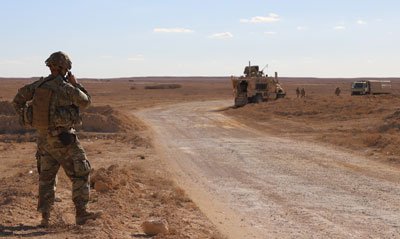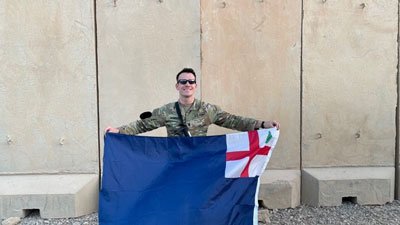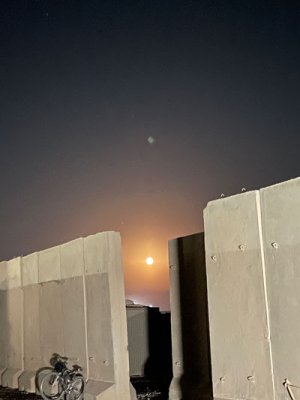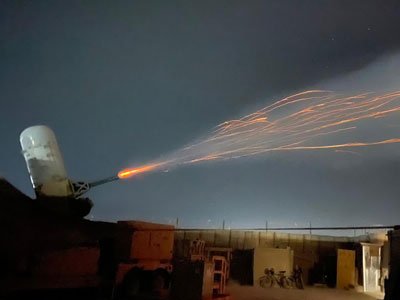We Did Not Fight. This Was Our War, if You Could Call It That.
It is March of 2023. I am in a cafe watching the Iraq War’s early stages play out in short clips on a television mounted on the wall in front of me. Marines barge through doors in Fallujah, unsure if it is violent death or an empty room awaiting them on the other side; soldiers patrol nameless streets in thinly armored Humvees that become engulfed in dust and smoke from an IED; sailors launch aircraft off of flight decks; airmen deliver shock and awe.
Scenes loop on the TV as the segment attempts to encapsulate 20 years of war, 20 years of anniversaries, 20 years of stories, in five minutes. The closed captioning fails to keep pace. Words scroll across the bottom of the screen, disjointed, lagging, all in the past tense, until troops shuffle onto planes and the anchor’s solemn face fades away into a commercial break, declaring the war’s end.

1st Lt. Matthew Fitzsimmons, platoon leader, Bravo Company, 4th Battalion, 9th Infantry Regiment, 1st Stryker Brigade Combat Team, 4th Infantry Division communicates with his platoon as a vehicle approaches their patrol at Al Asad Air Base in December 2021. Coalition forces perform security patrols to gain awareness of the area and interact with Iraqi soldiers to advise and assist. Photo by Arm Maj. Alexa Carlo-Hickman, courtesy of the U.S. Army.
We can’t know it yet, but another war in the Middle East looms—seven months from now, Israel and Hamas will be at war. Soon, Americans will read headlines about attacks on U.S. forces in Iraq and Syria by Iranian-aligned militias, shattering the illusion that our war ever ended.
It is with me still.
Jimmy, an old townie who owns this cafe, has made a series of interior decorating choices over the years that make it hard to describe his local joint as a cafe at all. The sign outside—neon—reads “Ana’s Cafe.” Inside, The Rolling Stones or Led Zeppelin blares from overhead speakers and four massive flat-screen TVs play news and Red Sox highlights.
If the ambiance does not meet the needs of the yuppies who have gentrified Charlestown over the past decade, Jimmy doesn’t seem to mind. He just bobs his head to the rhythm of the music behind the counter, taking in the sweet sounds of “Sympathy for the Devil,” and exchanges boisterous greetings with his favorite regulars. There’s Tommy the Kid in his smeared overalls, Good Ole Bill in his MBTA polo, and Mistah Law with a Boston Police shield and sloppily holstered pistol on his belt.
As Jimmy shuffles outside for a smoke, as he does every 15 minutes or so, I type “AUMF repeal” into my laptop, and see an article from the Associated Press. The Senate has voted to repeal the authorization of the use of military force against Iraq. I scroll down my news feed and see another article about a drone attack in Syria that killed an American contractor and wounded several American servicemembers. I try to feel sympathy or even outrage, but all I can muster is a familiar thought that runs on a loop in my mind, like the scenes of a supposedly ended war on Jimmy’s TV. Only a matter of time.
Though I served in Iraq, I still recognize the Syrian places and names in the news articles from the intelligence reports I once received in the base defense operations center of al-Asad Air Base. Green Village. Iranian-aligned militia groups.
Award-Winning Journalism in Your Inbox
Tucked between announcements about Russia and China, I find a Defense Department press release on the drone attack. It talks about retaliatory airstrikes against militia groups in Syria and the small footprint of America’s advise and assist mission in Operation Inherent Resolve. The terms and phrases are also familiar to me. Assist local partner forces to defeat ISIS. Not in a combat role
* * *
It is July of 2021, and I am in a C-17. It corkscrews toward Baghdad, where we will drop off our sister battery assigned to guard the embassy. The plane hems and haws the whole way down, moaning with the sounds of machinery, cargo, and souls. My friends and I sit side by side, cramped under rucksacks and Kevlar and weapons that push down onto our laps and into our chests. We stare silently into the dark cabin of the metal beast, illuminated by a dim hue of green.
Before walking up the ramp in Kuwait, I am already aware of the rocket and drone attacks that have engaged American forces across Iraq for a month, prompting the president to order retaliatory airstrikes, which, in turn, have elicited a wave of further rocket and drone attacks at the same American bases that await us. Just before we loaded onto the plane, our commander briefed us on intelligence reports about militias acquiring stinger missiles. This confuses me at first, but after the violent combat landing of our C-17, I understand.

Cameron McMillan with the Charlestown flag in front of some blast walls at Al Asad, Iraq. Photo courtesy of the author.
As part of Operation Inherent Resolve, we supposedly support the same mission as the wounded soldiers I’ll read about in Syria two years later: train, advise, and assist. The Iraqi army is our partner force, and we are there to support them in their fight against ISIS. But this is not the case. The rocket and drone attacks of our predecessors become ours, yet these objects of death are not launched by ISIS. Instead, Iran is the ghostly enemy that seeks our deaths, hunting us from afar through proxies with rockets launched from trucks on roads patrolled by the Iraqi army, our untrustworthy ally, and suicide drones flown from patches of nameless desert that often slip through our elaborate defenses.
The attacks do not stop when the United States announces the end of its combat mission. Despite press releases from the Pentagon, the daily life of our battery remains the same, interspersing daily monotony with occasional terror, day by day, and ironically receiving Combat Action Badges and even a few Purple Hearts during our noncombat mission.
As a counter rocket, artillery, mortar battle captain responsible for defending the base from these airborne threats, I am not privy to any of Operation Inherent Resolve’s training, advising, or assisting. Nor is anyone else I know on base. Occasionally, I see men with beards wearing civilian clothes and sporting fancy weapons. Secret squirrels, we call them. But lowly National Guardsmen like myself do well to avoid those types and do not ask questions.
My days consist of sitting in the BDOC, which my soldiers call “the splinter box,” referring to the splinters that would tear through our flesh in the event of a rocket or drone landing anywhere near our plywood fortress. I oversee a small crew of soldiers that tries to shoot down rockets and drones during eight-hour shifts through the 24-hour threat window. Instead of the unnecessary complications of military vernacular, technical and tactical terms, and meaningless acronyms that favor obscurity over reality, we use one simple saying to describe our daily lives: Rockets during the day, drones at night.

A blood moon shines over the blast walls that surround Cameron McMillan’s living area at Al Asad Air Base, Iraq. The entrance to a bunker, surrounded by Hesco barriers, can be seen through the break in the blast walls. Photo courtesy of the author.
Our war consists of these eight-hour shifts, marked by hours of extreme boredom and rare moments of acute fear. In between shifts, we simply pass time in even more excruciating boredom in our desert wasteland, also occasionally pierced by moments of an incoming alarm, which sends us running to bunkers or diving onto our bellies in the sand. We do not fight. We hide. This is our war, if you can call it that.
Coming off of the midnight shift one morning, my eyes still adjusting to the desert sun’s powerful glow, I pass a soldier from my battery as I head towards my containerized housing unit. He sits outside of his CHU, on plywood steps that lead up to his tin can home, and stares at the gravel beneath his feet, sucking and blowing white clouds of nicotine from his vape. Ever since the rocket attack during our first week that nearly blew him and his partner at his gun into pieces, leaving them with traumatic brain injuries, that’s what he does. Sits, and stares, and puffs, and blows. As I peek over at him, I look into his eyes, lifeless as though that rocket actually killed him, and think about the president’s speech at the UN General Assembly days ago.
“I stand here today, for the first time in 20 years, with the United States not at war,” he said. “We’ve turned the page.”
I look at his eyes again, certainly still at war, and I desperately want to turn a page of my own.
* * *
It is July 7, 2021, and I am somewhat in shock that I am still alive. My crew and I, all National Guardsmen, like almost everyone else on the base, have been in Iraq for three days. We are not yet used to the 120-degree heat that bakes down on us and sears into our eyes. Four hours earlier, 14 122mm Kaytusha rockets were launched at us. We did our best to follow the battle drill and shoot them down before they landed.
As the ground shook beneath our feet, sending a toxic mixture of sand, dust, and smoke into our nostrils, we learned that fear is as powerful as duty and training, if not more. I breathed the cloud into my lungs and thought I recognized a taste amidst the acrid smell, something potent, almost like a Black and Mild. Fourteen soldiers are now wounded, including two of our own, one badly enough to get an emergency medevac to Baghdad.
Returning to my containerized housing unit, I take off my gear and rest my weapon against the wall. I try to connect my phone to unreliable Wi-Fi so that I can send a message on WhatsApp to my girlfriend. I managed to get a connection and begin typing.
If you see something on the news about a rocket attack at my base, I’m okay.
Some time passes before I get a response, though I’m not sure how much.
I’m just glad you’re okay. I love you. There’s a pause before a typing icon appears from her end. I can’t find anything about it on the news.
I tell her not to worry. I take a deep breath only to see that my hands are trembling. I am not particularly religious, but I begin to say a prayer. I will say it every morning until I leave Iraq.
* * *
It is the spring of 2022, and my transition back into the civilian world is by all appearances a success. I work at a graduate school for international relations and live in my hometown of Boston with my fiancé. On my first day of work, amid a welcome from my new colleagues, I am shown a video of alumni pulling together to help evacuate Afghans from the Kabul airport during the withdrawal. The video has inspirational music and moving images of carnage, emotional distress, and the strength of camaraderie.

A Land-based Phalanx Weapon System fires at Al Asad Air Base, Iraq. The LPWS is part of the Counter Rocket, Artillery, Mortar (C-RAM) system that Cameron McMillan’s battery used to help protect coalition troops and assets from rockets and drones fired by Iranian-aligned militias. Photo courtesy of the author.
The video on my screen is replaced by the images of a drone feed that plays out in the BDOC at al-Asad. Men, women, and children scramble, beg, and fight to get into Hamid Karzai International Airport. Some successfully breach the perimeter and swarm the runways, where Marines and soldiers push them back with tear gas and warning shots. The drone’s camera pans to outside of the perimeter, where innocents are beaten and shot at by the Taliban and others plead desperately at the crowded gates.
We watch these feeds for two weeks as the chaos unfolds. We pray that we do not recognize any of the names from our sister battery that is posted at the airport when “IED blast Abbey gate” and “13 KIA” come across the intelligence chat. Eventually, that war ends in definite defeat, while our war continues in indefinite perpetuity.
* * *
I am back in the cafe. Jimmy has returned from his smoke. He blasts through the door, as if in a rush, and gives a holler to one of his regulars. He’s wearing cargo shorts and a short-sleeved T-shirt. Despite the temperature still hovering between the high 40s and low 50s, Jimmy has declared the end of winter and the start of spring—for himself, at least.
Award-Winning Journalism in Your Inbox
Looking at Jimmy, I consider how quickly his body adapts to changes in temperature and then try to recall what unit replaced us in Iraq. I’m not sure why. But I can’t recall the name, only that they were National Guard, perhaps from Virginia or Ohio.
It doesn’t matter, I decide. They’re home now, just like me, replaced by yet another unit that at this moment is still in the desert.
For them, the war continues.





Comments are closed.